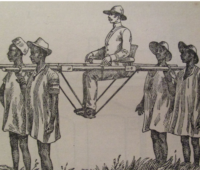Aymar Nyenyezi Bisoka, writing for our “Covid-19 and the Social Sciences” series, queries why Covid-19 has not become an “event” for Western social researchers: an accident that radically reverses the normal order of things. Instead, he demonstrates that the Black bodies of research assistants continue to carry the weight of a colonial system of knowledge production, rendering them vulnerable to dangerous conditions. How, Bisoka asks, might a decolonizing response change research practice—and how have African artistic productions helped to map this terrain?













